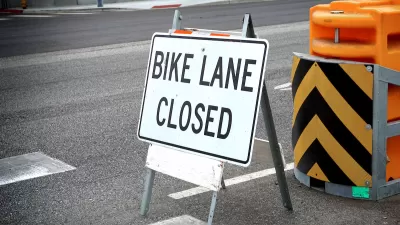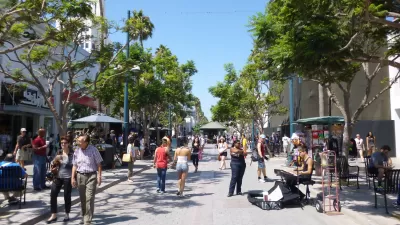This week L.A. City Council members voted to approve an ordinance that gives the city more flexibility to lower parking requirements in select areas of the city to encourage adaptive reuse and walkability, report David Zahniser and Kate Linthicum.
Supported by members of the business community and advocates of the city's "elegant density" policy that "seeks to channel growth along the city's expanding rail and bus corridors," the Modified Parking Requirement District ordinance was spearheaded by Council members in the Eastside and Central City with the goal of sparking "investment
in century-old neighborhoods designed without the car in mind," write Zahniser and Linthicum.
According to James Brasuell, writing in Curbed Los Angeles, "The ordinance allows for the creation of Modified Parking Requirement
districts that allow the use of 'one or more' of 'seven parking
requirement modification tools.' As explained in September,
those tools are: 1) change of use parking standards (i.e., if a
building's use changes, parking requirements won't), 2) use of a new
Parking Reduction Permit (individual projects could request fewer
required parking spaces), 3) buildings could move parking off-site to
within 1,500 feet, 4) decreased parking requirements, 5) increased
parking requirements, 6) commercial parking credits, and 7) maximum
parking limits (each use within a district has a set maximum number of
spaces)."
The ordinance is not without its critics, however, and one Councilmember, Paul Koretz, "who represents traffic-choked neighborhoods on the Westside," voted against it.
"Neighborhood activist Mike Eveloff, a Koretz constituent, said the
parking changes rely on 'wishful thinking' and the mistaken assumption
that when driving cars becomes too inconvenient, people will 'just not
use them,'" write Zahniser and Linthicum. "The winners in Tuesday's vote, he said, will be real estate
developers, who will no longer have to spend tens of thousands of
dollars to build parking spaces."
FULL STORY: Los Angeles might ease up on parking requirements for businesses

Alabama: Trump Terminates Settlements for Black Communities Harmed By Raw Sewage
Trump deemed the landmark civil rights agreement “illegal DEI and environmental justice policy.”

Planetizen Federal Action Tracker
A weekly monitor of how Trump’s orders and actions are impacting planners and planning in America.

The 120 Year Old Tiny Home Villages That Sheltered San Francisco’s Earthquake Refugees
More than a century ago, San Francisco mobilized to house thousands of residents displaced by the 1906 earthquake. Could their strategy offer a model for the present?

LA’s Tree Emergency Goes Beyond Vandalism
After a vandal destroyed dozens of downtown LA trees, Mayor Karen Bass vowed to replace them. Days later, she slashed the city’s tree budget.

Sacramento Leads Nation With Bus-Mounted Bike Lane Enforcement Cameras
The city is the first to use its bus-mounted traffic enforcement system to cite drivers who park or drive in bike lanes.

Seattle Voters Approve Social Housing Referendum
Voters approved a corporate tax to fund the city’s housing authority despite an opposition campaign funded by Amazon and Microsoft.
Urban Design for Planners 1: Software Tools
This six-course series explores essential urban design concepts using open source software and equips planners with the tools they need to participate fully in the urban design process.
Planning for Universal Design
Learn the tools for implementing Universal Design in planning regulations.
Ada County Highway District
Clanton & Associates, Inc.
Jessamine County Fiscal Court
Institute for Housing and Urban Development Studies (IHS)
City of Grandview
Harvard GSD Executive Education
Toledo-Lucas County Plan Commissions
Salt Lake City
NYU Wagner Graduate School of Public Service





























